Literature Review Report: Corporate Social Responsibility
VerifiedAdded on 2020/12/29
|12
|3045
|465
Report
AI Summary
This report provides an in-depth analysis of Corporate Social Responsibility (CSR), focusing on its definition, purpose, and significance in the business environment. It includes a comprehensive literature review, exploring various perspectives on CSR, including its impact on company morale, stakeholder engagement, and sustainable practices. The report examines key issues such as meeting social needs, conflicts among shareholders, and integrating CSR into corporate strategy. Furthermore, it analyzes different authors' viewpoints on CSR, highlighting its role in promoting business operations, contributing to sustainable growth, and enhancing financial performance. Recommendations are provided to improve CSR initiatives, emphasizing coordination among stakeholders, raising awareness through social media, and building effective bridges among stakeholders for successful implementation. This report serves as a valuable resource for understanding CSR's complexities and its potential for positive societal and business outcomes.

Study Skills for Higher Education
(Corporate Social Responsibility)
1 | Page
(Corporate Social Responsibility)
1 | Page
Paraphrase This Document
Need a fresh take? Get an instant paraphrase of this document with our AI Paraphraser

Executive Summary or Abstract
Corporate Social Responsibility is a business approach which enable the company to
satisfy and improve the morale of company as well as society. In present scenario,
organisation face issues in fulfilling CSR as the business environment has become very
complex and is bound with many legal obligations.
2 | Page
Corporate Social Responsibility is a business approach which enable the company to
satisfy and improve the morale of company as well as society. In present scenario,
organisation face issues in fulfilling CSR as the business environment has become very
complex and is bound with many legal obligations.
2 | Page
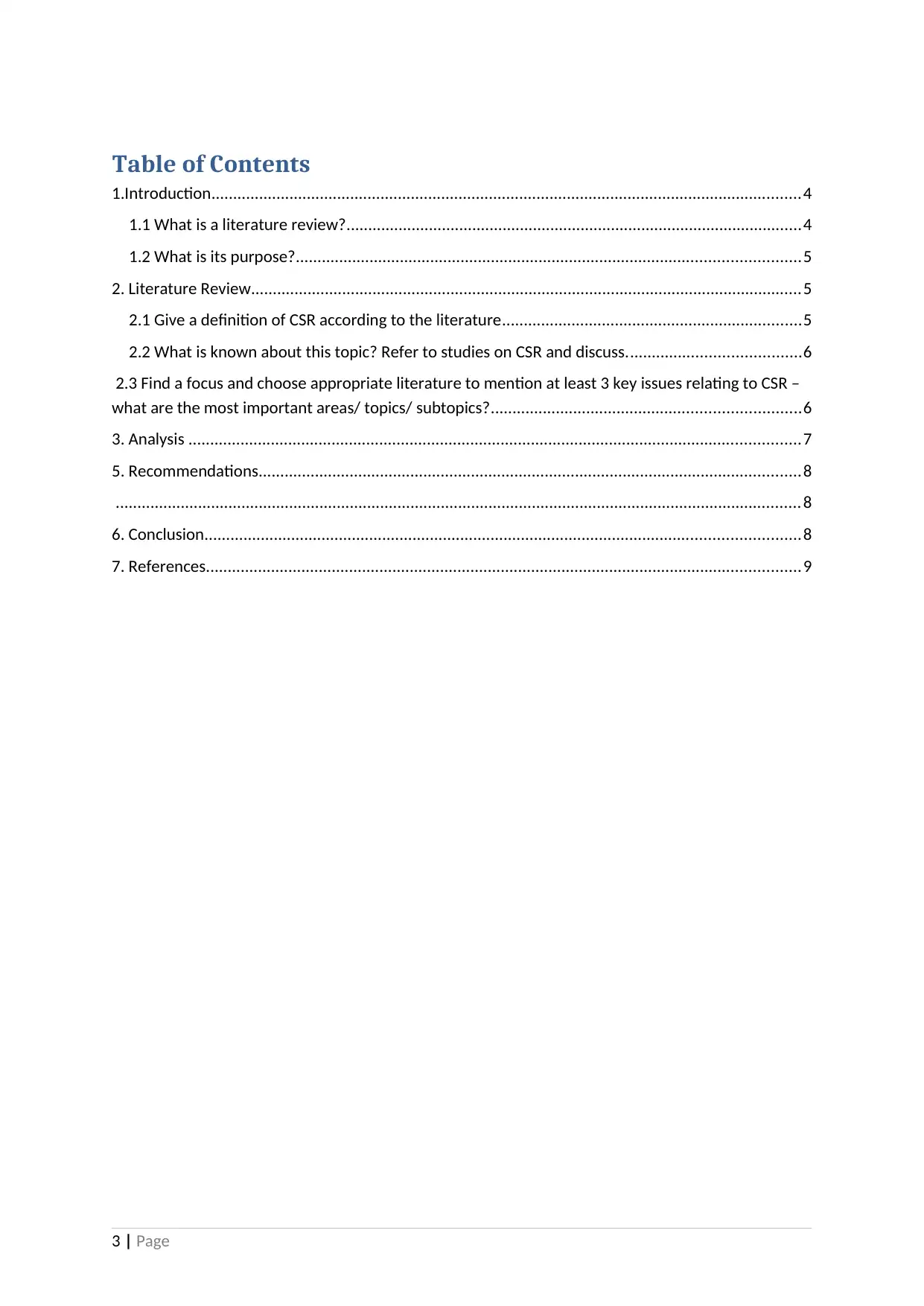
Table of Contents
1.Introduction........................................................................................................................................4
1.1 What is a literature review?.........................................................................................................4
1.2 What is its purpose?....................................................................................................................5
2. Literature Review...............................................................................................................................5
2.1 Give a definition of CSR according to the literature.....................................................................5
2.2 What is known about this topic? Refer to studies on CSR and discuss........................................6
2.3 Find a focus and choose appropriate literature to mention at least 3 key issues relating to CSR –
what are the most important areas/ topics/ subtopics?.......................................................................6
3. Analysis .............................................................................................................................................7
5. Recommendations.............................................................................................................................8
..............................................................................................................................................................8
6. Conclusion.........................................................................................................................................8
7. References.........................................................................................................................................9
3 | Page
1.Introduction........................................................................................................................................4
1.1 What is a literature review?.........................................................................................................4
1.2 What is its purpose?....................................................................................................................5
2. Literature Review...............................................................................................................................5
2.1 Give a definition of CSR according to the literature.....................................................................5
2.2 What is known about this topic? Refer to studies on CSR and discuss........................................6
2.3 Find a focus and choose appropriate literature to mention at least 3 key issues relating to CSR –
what are the most important areas/ topics/ subtopics?.......................................................................6
3. Analysis .............................................................................................................................................7
5. Recommendations.............................................................................................................................8
..............................................................................................................................................................8
6. Conclusion.........................................................................................................................................8
7. References.........................................................................................................................................9
3 | Page
⊘ This is a preview!⊘
Do you want full access?
Subscribe today to unlock all pages.

Trusted by 1+ million students worldwide
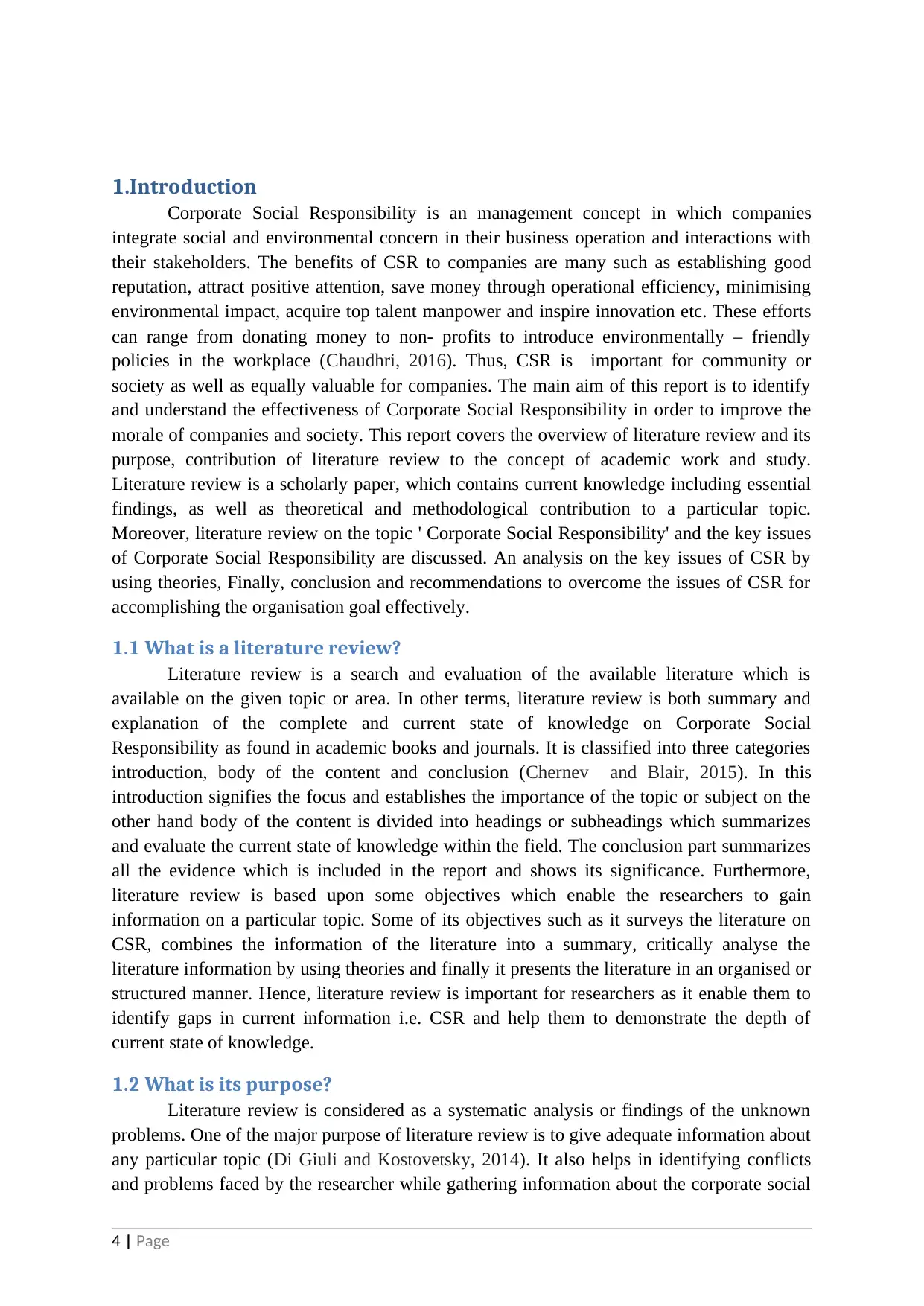
1.Introduction
Corporate Social Responsibility is an management concept in which companies
integrate social and environmental concern in their business operation and interactions with
their stakeholders. The benefits of CSR to companies are many such as establishing good
reputation, attract positive attention, save money through operational efficiency, minimising
environmental impact, acquire top talent manpower and inspire innovation etc. These efforts
can range from donating money to non- profits to introduce environmentally – friendly
policies in the workplace (Chaudhri, 2016). Thus, CSR is important for community or
society as well as equally valuable for companies. The main aim of this report is to identify
and understand the effectiveness of Corporate Social Responsibility in order to improve the
morale of companies and society. This report covers the overview of literature review and its
purpose, contribution of literature review to the concept of academic work and study.
Literature review is a scholarly paper, which contains current knowledge including essential
findings, as well as theoretical and methodological contribution to a particular topic.
Moreover, literature review on the topic ' Corporate Social Responsibility' and the key issues
of Corporate Social Responsibility are discussed. An analysis on the key issues of CSR by
using theories, Finally, conclusion and recommendations to overcome the issues of CSR for
accomplishing the organisation goal effectively.
1.1 What is a literature review?
Literature review is a search and evaluation of the available literature which is
available on the given topic or area. In other terms, literature review is both summary and
explanation of the complete and current state of knowledge on Corporate Social
Responsibility as found in academic books and journals. It is classified into three categories
introduction, body of the content and conclusion (Chernev and Blair, 2015). In this
introduction signifies the focus and establishes the importance of the topic or subject on the
other hand body of the content is divided into headings or subheadings which summarizes
and evaluate the current state of knowledge within the field. The conclusion part summarizes
all the evidence which is included in the report and shows its significance. Furthermore,
literature review is based upon some objectives which enable the researchers to gain
information on a particular topic. Some of its objectives such as it surveys the literature on
CSR, combines the information of the literature into a summary, critically analyse the
literature information by using theories and finally it presents the literature in an organised or
structured manner. Hence, literature review is important for researchers as it enable them to
identify gaps in current information i.e. CSR and help them to demonstrate the depth of
current state of knowledge.
1.2 What is its purpose?
Literature review is considered as a systematic analysis or findings of the unknown
problems. One of the major purpose of literature review is to give adequate information about
any particular topic (Di Giuli and Kostovetsky, 2014). It also helps in identifying conflicts
and problems faced by the researcher while gathering information about the corporate social
4 | Page
Corporate Social Responsibility is an management concept in which companies
integrate social and environmental concern in their business operation and interactions with
their stakeholders. The benefits of CSR to companies are many such as establishing good
reputation, attract positive attention, save money through operational efficiency, minimising
environmental impact, acquire top talent manpower and inspire innovation etc. These efforts
can range from donating money to non- profits to introduce environmentally – friendly
policies in the workplace (Chaudhri, 2016). Thus, CSR is important for community or
society as well as equally valuable for companies. The main aim of this report is to identify
and understand the effectiveness of Corporate Social Responsibility in order to improve the
morale of companies and society. This report covers the overview of literature review and its
purpose, contribution of literature review to the concept of academic work and study.
Literature review is a scholarly paper, which contains current knowledge including essential
findings, as well as theoretical and methodological contribution to a particular topic.
Moreover, literature review on the topic ' Corporate Social Responsibility' and the key issues
of Corporate Social Responsibility are discussed. An analysis on the key issues of CSR by
using theories, Finally, conclusion and recommendations to overcome the issues of CSR for
accomplishing the organisation goal effectively.
1.1 What is a literature review?
Literature review is a search and evaluation of the available literature which is
available on the given topic or area. In other terms, literature review is both summary and
explanation of the complete and current state of knowledge on Corporate Social
Responsibility as found in academic books and journals. It is classified into three categories
introduction, body of the content and conclusion (Chernev and Blair, 2015). In this
introduction signifies the focus and establishes the importance of the topic or subject on the
other hand body of the content is divided into headings or subheadings which summarizes
and evaluate the current state of knowledge within the field. The conclusion part summarizes
all the evidence which is included in the report and shows its significance. Furthermore,
literature review is based upon some objectives which enable the researchers to gain
information on a particular topic. Some of its objectives such as it surveys the literature on
CSR, combines the information of the literature into a summary, critically analyse the
literature information by using theories and finally it presents the literature in an organised or
structured manner. Hence, literature review is important for researchers as it enable them to
identify gaps in current information i.e. CSR and help them to demonstrate the depth of
current state of knowledge.
1.2 What is its purpose?
Literature review is considered as a systematic analysis or findings of the unknown
problems. One of the major purpose of literature review is to give adequate information about
any particular topic (Di Giuli and Kostovetsky, 2014). It also helps in identifying conflicts
and problems faced by the researcher while gathering information about the corporate social
4 | Page
Paraphrase This Document
Need a fresh take? Get an instant paraphrase of this document with our AI Paraphraser
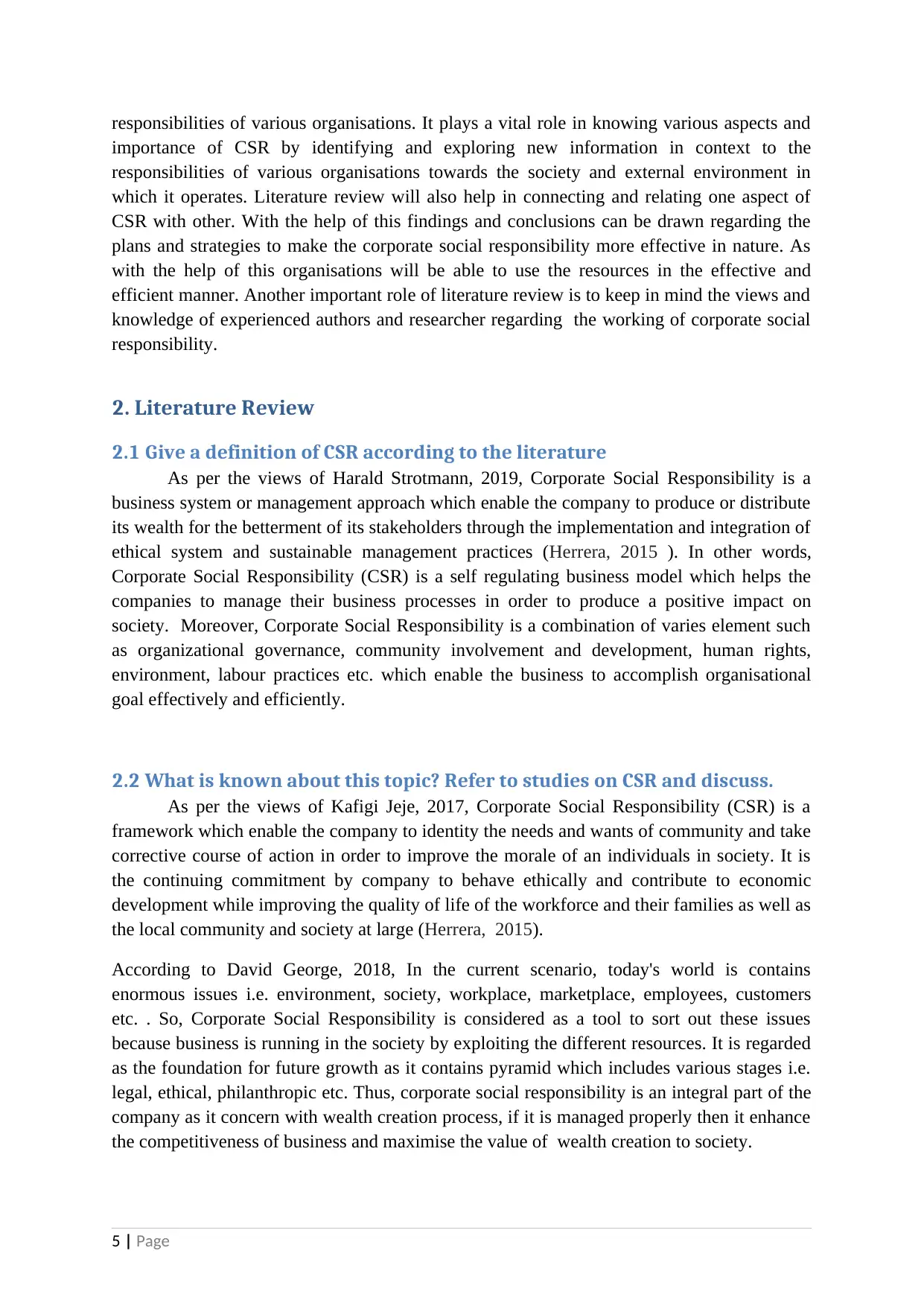
responsibilities of various organisations. It plays a vital role in knowing various aspects and
importance of CSR by identifying and exploring new information in context to the
responsibilities of various organisations towards the society and external environment in
which it operates. Literature review will also help in connecting and relating one aspect of
CSR with other. With the help of this findings and conclusions can be drawn regarding the
plans and strategies to make the corporate social responsibility more effective in nature. As
with the help of this organisations will be able to use the resources in the effective and
efficient manner. Another important role of literature review is to keep in mind the views and
knowledge of experienced authors and researcher regarding the working of corporate social
responsibility.
2. Literature Review
2.1 Give a definition of CSR according to the literature
As per the views of Harald Strotmann, 2019, Corporate Social Responsibility is a
business system or management approach which enable the company to produce or distribute
its wealth for the betterment of its stakeholders through the implementation and integration of
ethical system and sustainable management practices (Herrera, 2015 ). In other words,
Corporate Social Responsibility (CSR) is a self regulating business model which helps the
companies to manage their business processes in order to produce a positive impact on
society. Moreover, Corporate Social Responsibility is a combination of varies element such
as organizational governance, community involvement and development, human rights,
environment, labour practices etc. which enable the business to accomplish organisational
goal effectively and efficiently.
2.2 What is known about this topic? Refer to studies on CSR and discuss.
As per the views of Kafigi Jeje, 2017, Corporate Social Responsibility (CSR) is a
framework which enable the company to identity the needs and wants of community and take
corrective course of action in order to improve the morale of an individuals in society. It is
the continuing commitment by company to behave ethically and contribute to economic
development while improving the quality of life of the workforce and their families as well as
the local community and society at large (Herrera, 2015).
According to David George, 2018, In the current scenario, today's world is contains
enormous issues i.e. environment, society, workplace, marketplace, employees, customers
etc. . So, Corporate Social Responsibility is considered as a tool to sort out these issues
because business is running in the society by exploiting the different resources. It is regarded
as the foundation for future growth as it contains pyramid which includes various stages i.e.
legal, ethical, philanthropic etc. Thus, corporate social responsibility is an integral part of the
company as it concern with wealth creation process, if it is managed properly then it enhance
the competitiveness of business and maximise the value of wealth creation to society.
5 | Page
importance of CSR by identifying and exploring new information in context to the
responsibilities of various organisations towards the society and external environment in
which it operates. Literature review will also help in connecting and relating one aspect of
CSR with other. With the help of this findings and conclusions can be drawn regarding the
plans and strategies to make the corporate social responsibility more effective in nature. As
with the help of this organisations will be able to use the resources in the effective and
efficient manner. Another important role of literature review is to keep in mind the views and
knowledge of experienced authors and researcher regarding the working of corporate social
responsibility.
2. Literature Review
2.1 Give a definition of CSR according to the literature
As per the views of Harald Strotmann, 2019, Corporate Social Responsibility is a
business system or management approach which enable the company to produce or distribute
its wealth for the betterment of its stakeholders through the implementation and integration of
ethical system and sustainable management practices (Herrera, 2015 ). In other words,
Corporate Social Responsibility (CSR) is a self regulating business model which helps the
companies to manage their business processes in order to produce a positive impact on
society. Moreover, Corporate Social Responsibility is a combination of varies element such
as organizational governance, community involvement and development, human rights,
environment, labour practices etc. which enable the business to accomplish organisational
goal effectively and efficiently.
2.2 What is known about this topic? Refer to studies on CSR and discuss.
As per the views of Kafigi Jeje, 2017, Corporate Social Responsibility (CSR) is a
framework which enable the company to identity the needs and wants of community and take
corrective course of action in order to improve the morale of an individuals in society. It is
the continuing commitment by company to behave ethically and contribute to economic
development while improving the quality of life of the workforce and their families as well as
the local community and society at large (Herrera, 2015).
According to David George, 2018, In the current scenario, today's world is contains
enormous issues i.e. environment, society, workplace, marketplace, employees, customers
etc. . So, Corporate Social Responsibility is considered as a tool to sort out these issues
because business is running in the society by exploiting the different resources. It is regarded
as the foundation for future growth as it contains pyramid which includes various stages i.e.
legal, ethical, philanthropic etc. Thus, corporate social responsibility is an integral part of the
company as it concern with wealth creation process, if it is managed properly then it enhance
the competitiveness of business and maximise the value of wealth creation to society.
5 | Page
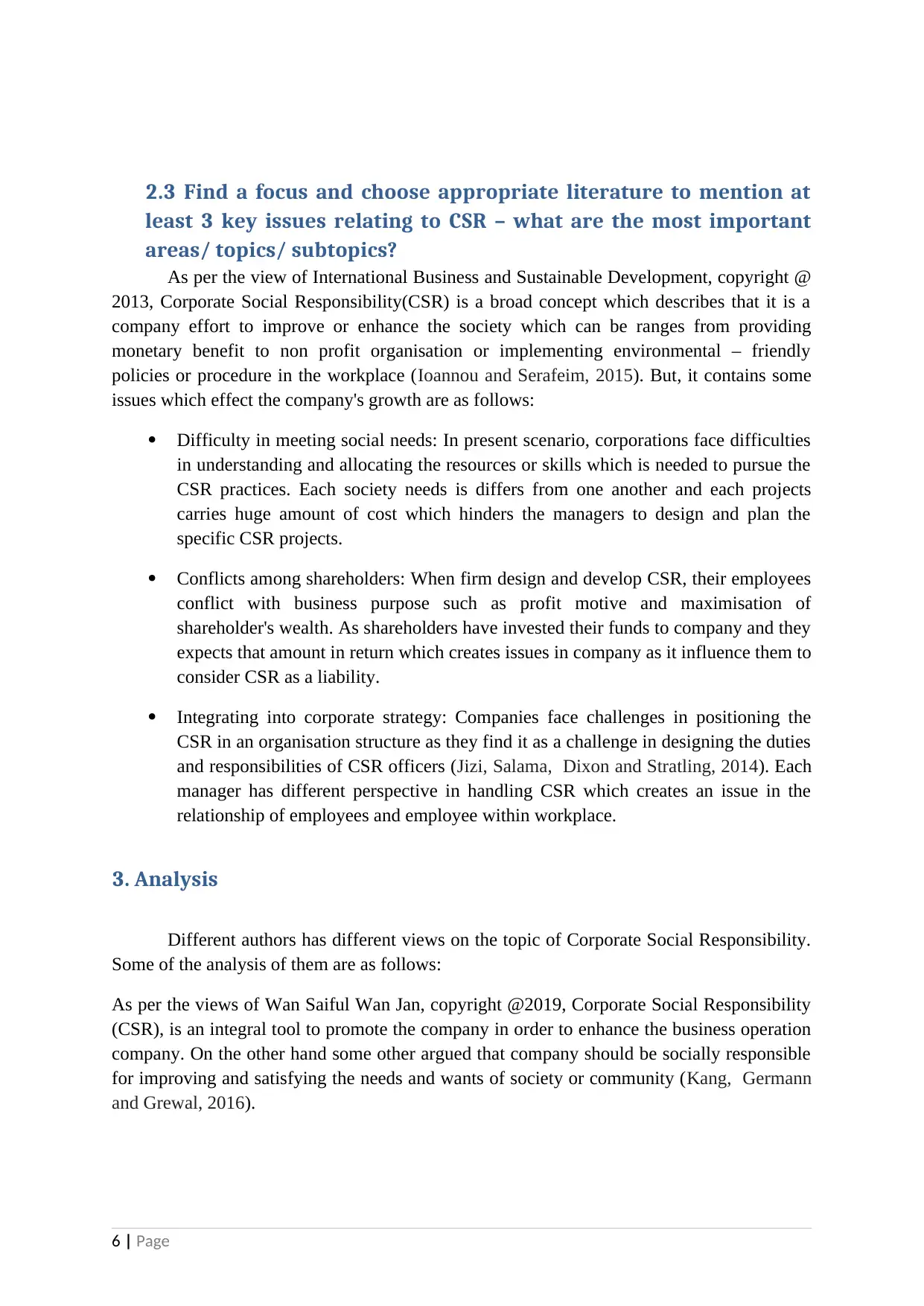
2.3 Find a focus and choose appropriate literature to mention at
least 3 key issues relating to CSR – what are the most important
areas/ topics/ subtopics?
As per the view of International Business and Sustainable Development, copyright @
2013, Corporate Social Responsibility(CSR) is a broad concept which describes that it is a
company effort to improve or enhance the society which can be ranges from providing
monetary benefit to non profit organisation or implementing environmental – friendly
policies or procedure in the workplace (Ioannou and Serafeim, 2015). But, it contains some
issues which effect the company's growth are as follows:
Difficulty in meeting social needs: In present scenario, corporations face difficulties
in understanding and allocating the resources or skills which is needed to pursue the
CSR practices. Each society needs is differs from one another and each projects
carries huge amount of cost which hinders the managers to design and plan the
specific CSR projects.
Conflicts among shareholders: When firm design and develop CSR, their employees
conflict with business purpose such as profit motive and maximisation of
shareholder's wealth. As shareholders have invested their funds to company and they
expects that amount in return which creates issues in company as it influence them to
consider CSR as a liability.
Integrating into corporate strategy: Companies face challenges in positioning the
CSR in an organisation structure as they find it as a challenge in designing the duties
and responsibilities of CSR officers (Jizi, Salama, Dixon and Stratling, 2014). Each
manager has different perspective in handling CSR which creates an issue in the
relationship of employees and employee within workplace.
3. Analysis
Different authors has different views on the topic of Corporate Social Responsibility.
Some of the analysis of them are as follows:
As per the views of Wan Saiful Wan Jan, copyright @2019, Corporate Social Responsibility
(CSR), is an integral tool to promote the company in order to enhance the business operation
company. On the other hand some other argued that company should be socially responsible
for improving and satisfying the needs and wants of society or community (Kang, Germann
and Grewal, 2016).
6 | Page
least 3 key issues relating to CSR – what are the most important
areas/ topics/ subtopics?
As per the view of International Business and Sustainable Development, copyright @
2013, Corporate Social Responsibility(CSR) is a broad concept which describes that it is a
company effort to improve or enhance the society which can be ranges from providing
monetary benefit to non profit organisation or implementing environmental – friendly
policies or procedure in the workplace (Ioannou and Serafeim, 2015). But, it contains some
issues which effect the company's growth are as follows:
Difficulty in meeting social needs: In present scenario, corporations face difficulties
in understanding and allocating the resources or skills which is needed to pursue the
CSR practices. Each society needs is differs from one another and each projects
carries huge amount of cost which hinders the managers to design and plan the
specific CSR projects.
Conflicts among shareholders: When firm design and develop CSR, their employees
conflict with business purpose such as profit motive and maximisation of
shareholder's wealth. As shareholders have invested their funds to company and they
expects that amount in return which creates issues in company as it influence them to
consider CSR as a liability.
Integrating into corporate strategy: Companies face challenges in positioning the
CSR in an organisation structure as they find it as a challenge in designing the duties
and responsibilities of CSR officers (Jizi, Salama, Dixon and Stratling, 2014). Each
manager has different perspective in handling CSR which creates an issue in the
relationship of employees and employee within workplace.
3. Analysis
Different authors has different views on the topic of Corporate Social Responsibility.
Some of the analysis of them are as follows:
As per the views of Wan Saiful Wan Jan, copyright @2019, Corporate Social Responsibility
(CSR), is an integral tool to promote the company in order to enhance the business operation
company. On the other hand some other argued that company should be socially responsible
for improving and satisfying the needs and wants of society or community (Kang, Germann
and Grewal, 2016).
6 | Page
⊘ This is a preview!⊘
Do you want full access?
Subscribe today to unlock all pages.

Trusted by 1+ million students worldwide
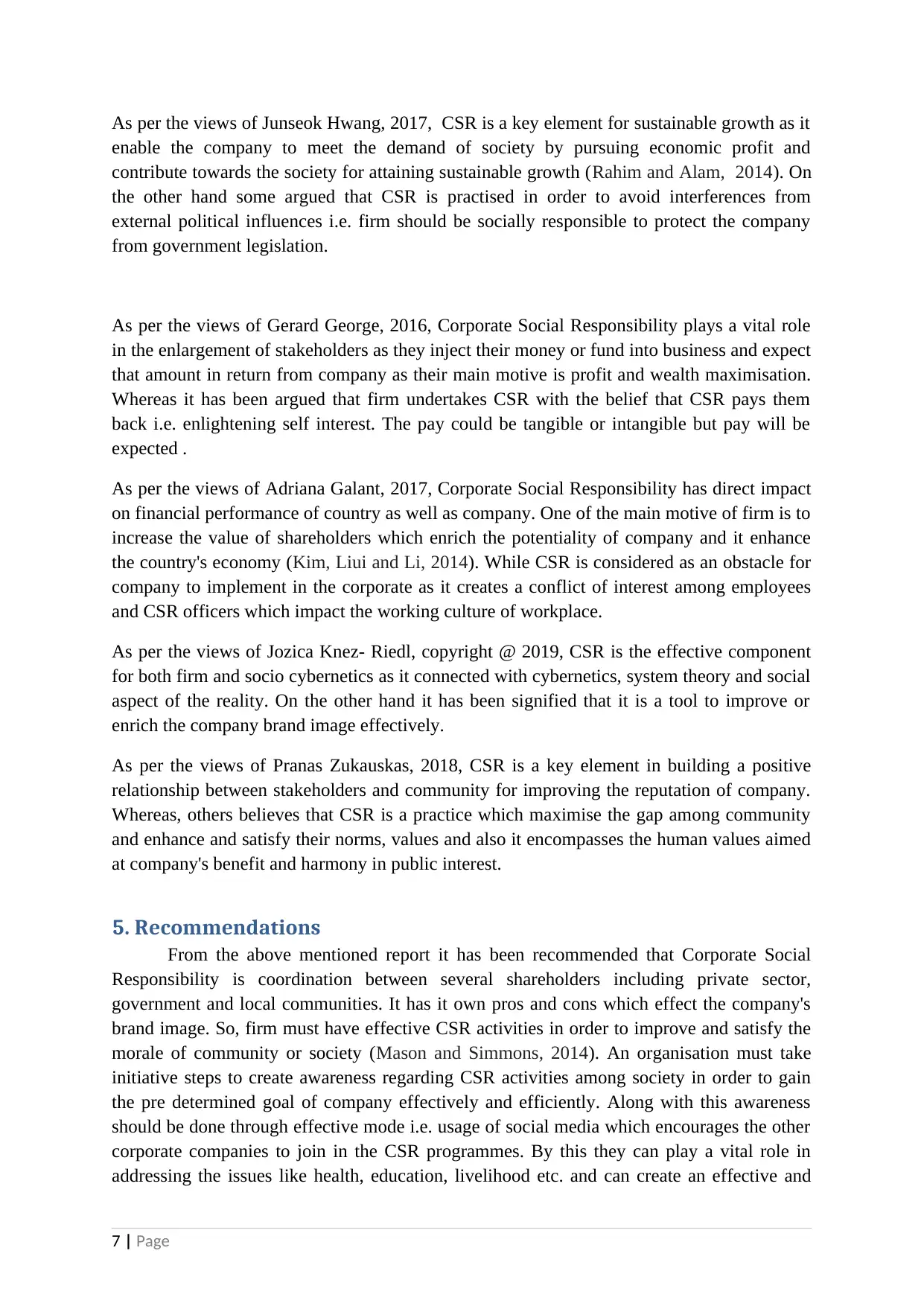
As per the views of Junseok Hwang, 2017, CSR is a key element for sustainable growth as it
enable the company to meet the demand of society by pursuing economic profit and
contribute towards the society for attaining sustainable growth (Rahim and Alam, 2014). On
the other hand some argued that CSR is practised in order to avoid interferences from
external political influences i.e. firm should be socially responsible to protect the company
from government legislation.
As per the views of Gerard George, 2016, Corporate Social Responsibility plays a vital role
in the enlargement of stakeholders as they inject their money or fund into business and expect
that amount in return from company as their main motive is profit and wealth maximisation.
Whereas it has been argued that firm undertakes CSR with the belief that CSR pays them
back i.e. enlightening self interest. The pay could be tangible or intangible but pay will be
expected .
As per the views of Adriana Galant, 2017, Corporate Social Responsibility has direct impact
on financial performance of country as well as company. One of the main motive of firm is to
increase the value of shareholders which enrich the potentiality of company and it enhance
the country's economy (Kim, Liui and Li, 2014). While CSR is considered as an obstacle for
company to implement in the corporate as it creates a conflict of interest among employees
and CSR officers which impact the working culture of workplace.
As per the views of Jozica Knez- Riedl, copyright @ 2019, CSR is the effective component
for both firm and socio cybernetics as it connected with cybernetics, system theory and social
aspect of the reality. On the other hand it has been signified that it is a tool to improve or
enrich the company brand image effectively.
As per the views of Pranas Zukauskas, 2018, CSR is a key element in building a positive
relationship between stakeholders and community for improving the reputation of company.
Whereas, others believes that CSR is a practice which maximise the gap among community
and enhance and satisfy their norms, values and also it encompasses the human values aimed
at company's benefit and harmony in public interest.
5. Recommendations
From the above mentioned report it has been recommended that Corporate Social
Responsibility is coordination between several shareholders including private sector,
government and local communities. It has it own pros and cons which effect the company's
brand image. So, firm must have effective CSR activities in order to improve and satisfy the
morale of community or society (Mason and Simmons, 2014). An organisation must take
initiative steps to create awareness regarding CSR activities among society in order to gain
the pre determined goal of company effectively and efficiently. Along with this awareness
should be done through effective mode i.e. usage of social media which encourages the other
corporate companies to join in the CSR programmes. By this they can play a vital role in
addressing the issues like health, education, livelihood etc. and can create an effective and
7 | Page
enable the company to meet the demand of society by pursuing economic profit and
contribute towards the society for attaining sustainable growth (Rahim and Alam, 2014). On
the other hand some argued that CSR is practised in order to avoid interferences from
external political influences i.e. firm should be socially responsible to protect the company
from government legislation.
As per the views of Gerard George, 2016, Corporate Social Responsibility plays a vital role
in the enlargement of stakeholders as they inject their money or fund into business and expect
that amount in return from company as their main motive is profit and wealth maximisation.
Whereas it has been argued that firm undertakes CSR with the belief that CSR pays them
back i.e. enlightening self interest. The pay could be tangible or intangible but pay will be
expected .
As per the views of Adriana Galant, 2017, Corporate Social Responsibility has direct impact
on financial performance of country as well as company. One of the main motive of firm is to
increase the value of shareholders which enrich the potentiality of company and it enhance
the country's economy (Kim, Liui and Li, 2014). While CSR is considered as an obstacle for
company to implement in the corporate as it creates a conflict of interest among employees
and CSR officers which impact the working culture of workplace.
As per the views of Jozica Knez- Riedl, copyright @ 2019, CSR is the effective component
for both firm and socio cybernetics as it connected with cybernetics, system theory and social
aspect of the reality. On the other hand it has been signified that it is a tool to improve or
enrich the company brand image effectively.
As per the views of Pranas Zukauskas, 2018, CSR is a key element in building a positive
relationship between stakeholders and community for improving the reputation of company.
Whereas, others believes that CSR is a practice which maximise the gap among community
and enhance and satisfy their norms, values and also it encompasses the human values aimed
at company's benefit and harmony in public interest.
5. Recommendations
From the above mentioned report it has been recommended that Corporate Social
Responsibility is coordination between several shareholders including private sector,
government and local communities. It has it own pros and cons which effect the company's
brand image. So, firm must have effective CSR activities in order to improve and satisfy the
morale of community or society (Mason and Simmons, 2014). An organisation must take
initiative steps to create awareness regarding CSR activities among society in order to gain
the pre determined goal of company effectively and efficiently. Along with this awareness
should be done through effective mode i.e. usage of social media which encourages the other
corporate companies to join in the CSR programmes. By this they can play a vital role in
addressing the issues like health, education, livelihood etc. and can create an effective and
7 | Page
Paraphrase This Document
Need a fresh take? Get an instant paraphrase of this document with our AI Paraphraser
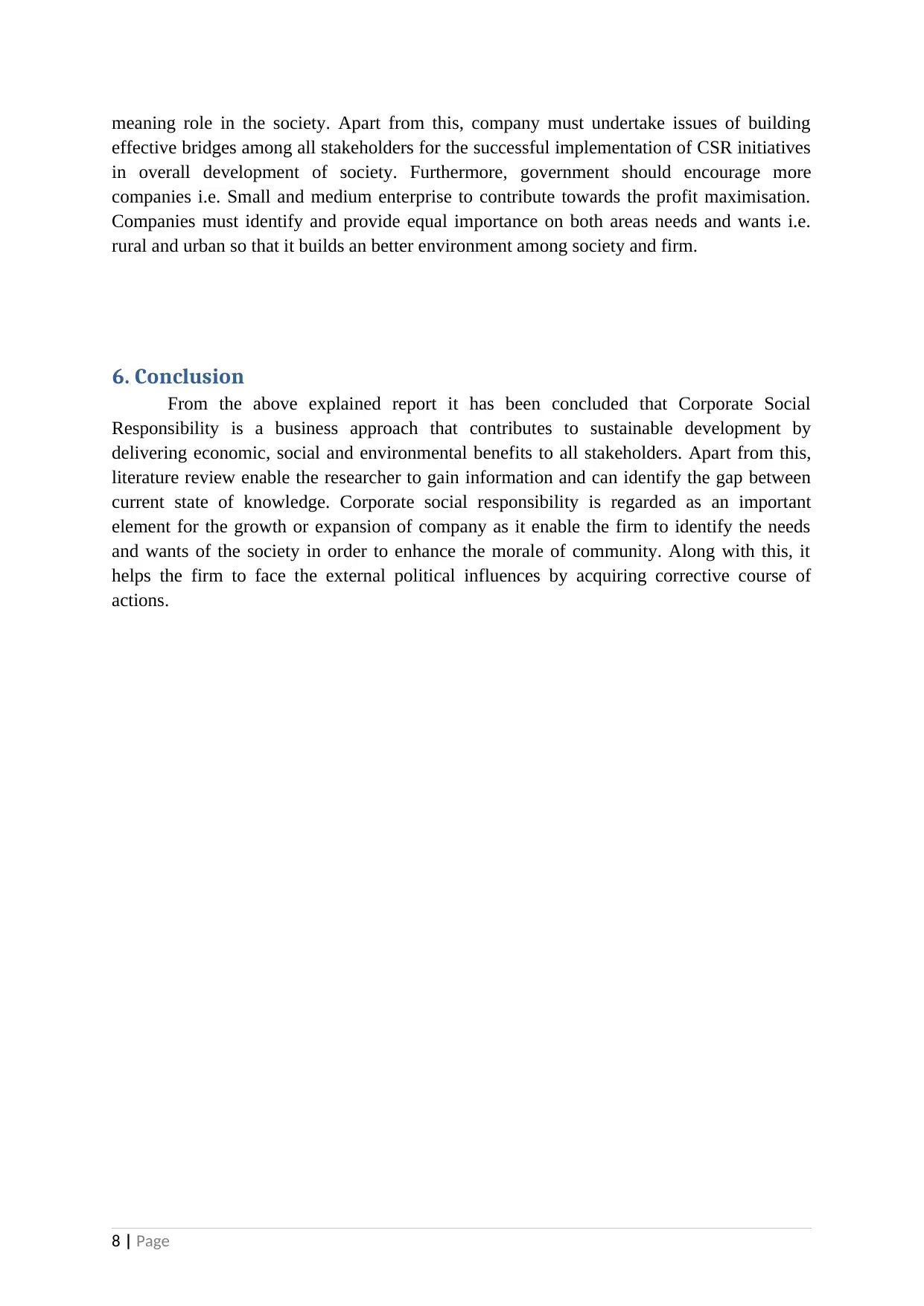
meaning role in the society. Apart from this, company must undertake issues of building
effective bridges among all stakeholders for the successful implementation of CSR initiatives
in overall development of society. Furthermore, government should encourage more
companies i.e. Small and medium enterprise to contribute towards the profit maximisation.
Companies must identify and provide equal importance on both areas needs and wants i.e.
rural and urban so that it builds an better environment among society and firm.
6. Conclusion
From the above explained report it has been concluded that Corporate Social
Responsibility is a business approach that contributes to sustainable development by
delivering economic, social and environmental benefits to all stakeholders. Apart from this,
literature review enable the researcher to gain information and can identify the gap between
current state of knowledge. Corporate social responsibility is regarded as an important
element for the growth or expansion of company as it enable the firm to identify the needs
and wants of the society in order to enhance the morale of community. Along with this, it
helps the firm to face the external political influences by acquiring corrective course of
actions.
8 | Page
effective bridges among all stakeholders for the successful implementation of CSR initiatives
in overall development of society. Furthermore, government should encourage more
companies i.e. Small and medium enterprise to contribute towards the profit maximisation.
Companies must identify and provide equal importance on both areas needs and wants i.e.
rural and urban so that it builds an better environment among society and firm.
6. Conclusion
From the above explained report it has been concluded that Corporate Social
Responsibility is a business approach that contributes to sustainable development by
delivering economic, social and environmental benefits to all stakeholders. Apart from this,
literature review enable the researcher to gain information and can identify the gap between
current state of knowledge. Corporate social responsibility is regarded as an important
element for the growth or expansion of company as it enable the firm to identify the needs
and wants of the society in order to enhance the morale of community. Along with this, it
helps the firm to face the external political influences by acquiring corrective course of
actions.
8 | Page
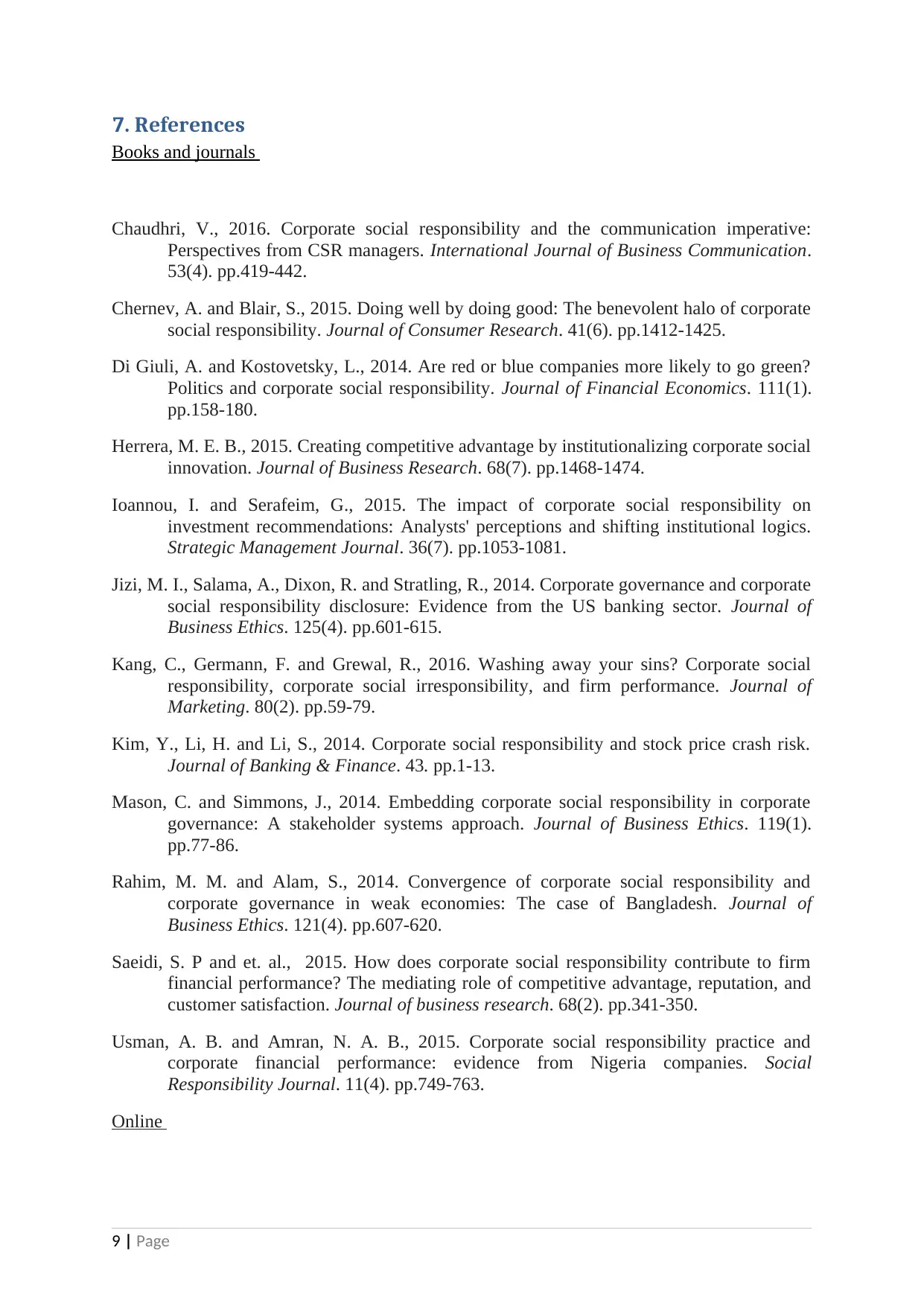
7. References
Books and journals
Chaudhri, V., 2016. Corporate social responsibility and the communication imperative:
Perspectives from CSR managers. International Journal of Business Communication.
53(4). pp.419-442.
Chernev, A. and Blair, S., 2015. Doing well by doing good: The benevolent halo of corporate
social responsibility. Journal of Consumer Research. 41(6). pp.1412-1425.
Di Giuli, A. and Kostovetsky, L., 2014. Are red or blue companies more likely to go green?
Politics and corporate social responsibility. Journal of Financial Economics. 111(1).
pp.158-180.
Herrera, M. E. B., 2015. Creating competitive advantage by institutionalizing corporate social
innovation. Journal of Business Research. 68(7). pp.1468-1474.
Ioannou, I. and Serafeim, G., 2015. The impact of corporate social responsibility on
investment recommendations: Analysts' perceptions and shifting institutional logics.
Strategic Management Journal. 36(7). pp.1053-1081.
Jizi, M. I., Salama, A., Dixon, R. and Stratling, R., 2014. Corporate governance and corporate
social responsibility disclosure: Evidence from the US banking sector. Journal of
Business Ethics. 125(4). pp.601-615.
Kang, C., Germann, F. and Grewal, R., 2016. Washing away your sins? Corporate social
responsibility, corporate social irresponsibility, and firm performance. Journal of
Marketing. 80(2). pp.59-79.
Kim, Y., Li, H. and Li, S., 2014. Corporate social responsibility and stock price crash risk.
Journal of Banking & Finance. 43. pp.1-13.
Mason, C. and Simmons, J., 2014. Embedding corporate social responsibility in corporate
governance: A stakeholder systems approach. Journal of Business Ethics. 119(1).
pp.77-86.
Rahim, M. M. and Alam, S., 2014. Convergence of corporate social responsibility and
corporate governance in weak economies: The case of Bangladesh. Journal of
Business Ethics. 121(4). pp.607-620.
Saeidi, S. P and et. al., 2015. How does corporate social responsibility contribute to firm
financial performance? The mediating role of competitive advantage, reputation, and
customer satisfaction. Journal of business research. 68(2). pp.341-350.
Usman, A. B. and Amran, N. A. B., 2015. Corporate social responsibility practice and
corporate financial performance: evidence from Nigeria companies. Social
Responsibility Journal. 11(4). pp.749-763.
Online
9 | Page
Books and journals
Chaudhri, V., 2016. Corporate social responsibility and the communication imperative:
Perspectives from CSR managers. International Journal of Business Communication.
53(4). pp.419-442.
Chernev, A. and Blair, S., 2015. Doing well by doing good: The benevolent halo of corporate
social responsibility. Journal of Consumer Research. 41(6). pp.1412-1425.
Di Giuli, A. and Kostovetsky, L., 2014. Are red or blue companies more likely to go green?
Politics and corporate social responsibility. Journal of Financial Economics. 111(1).
pp.158-180.
Herrera, M. E. B., 2015. Creating competitive advantage by institutionalizing corporate social
innovation. Journal of Business Research. 68(7). pp.1468-1474.
Ioannou, I. and Serafeim, G., 2015. The impact of corporate social responsibility on
investment recommendations: Analysts' perceptions and shifting institutional logics.
Strategic Management Journal. 36(7). pp.1053-1081.
Jizi, M. I., Salama, A., Dixon, R. and Stratling, R., 2014. Corporate governance and corporate
social responsibility disclosure: Evidence from the US banking sector. Journal of
Business Ethics. 125(4). pp.601-615.
Kang, C., Germann, F. and Grewal, R., 2016. Washing away your sins? Corporate social
responsibility, corporate social irresponsibility, and firm performance. Journal of
Marketing. 80(2). pp.59-79.
Kim, Y., Li, H. and Li, S., 2014. Corporate social responsibility and stock price crash risk.
Journal of Banking & Finance. 43. pp.1-13.
Mason, C. and Simmons, J., 2014. Embedding corporate social responsibility in corporate
governance: A stakeholder systems approach. Journal of Business Ethics. 119(1).
pp.77-86.
Rahim, M. M. and Alam, S., 2014. Convergence of corporate social responsibility and
corporate governance in weak economies: The case of Bangladesh. Journal of
Business Ethics. 121(4). pp.607-620.
Saeidi, S. P and et. al., 2015. How does corporate social responsibility contribute to firm
financial performance? The mediating role of competitive advantage, reputation, and
customer satisfaction. Journal of business research. 68(2). pp.341-350.
Usman, A. B. and Amran, N. A. B., 2015. Corporate social responsibility practice and
corporate financial performance: evidence from Nigeria companies. Social
Responsibility Journal. 11(4). pp.749-763.
Online
9 | Page
⊘ This is a preview!⊘
Do you want full access?
Subscribe today to unlock all pages.

Trusted by 1+ million students worldwide
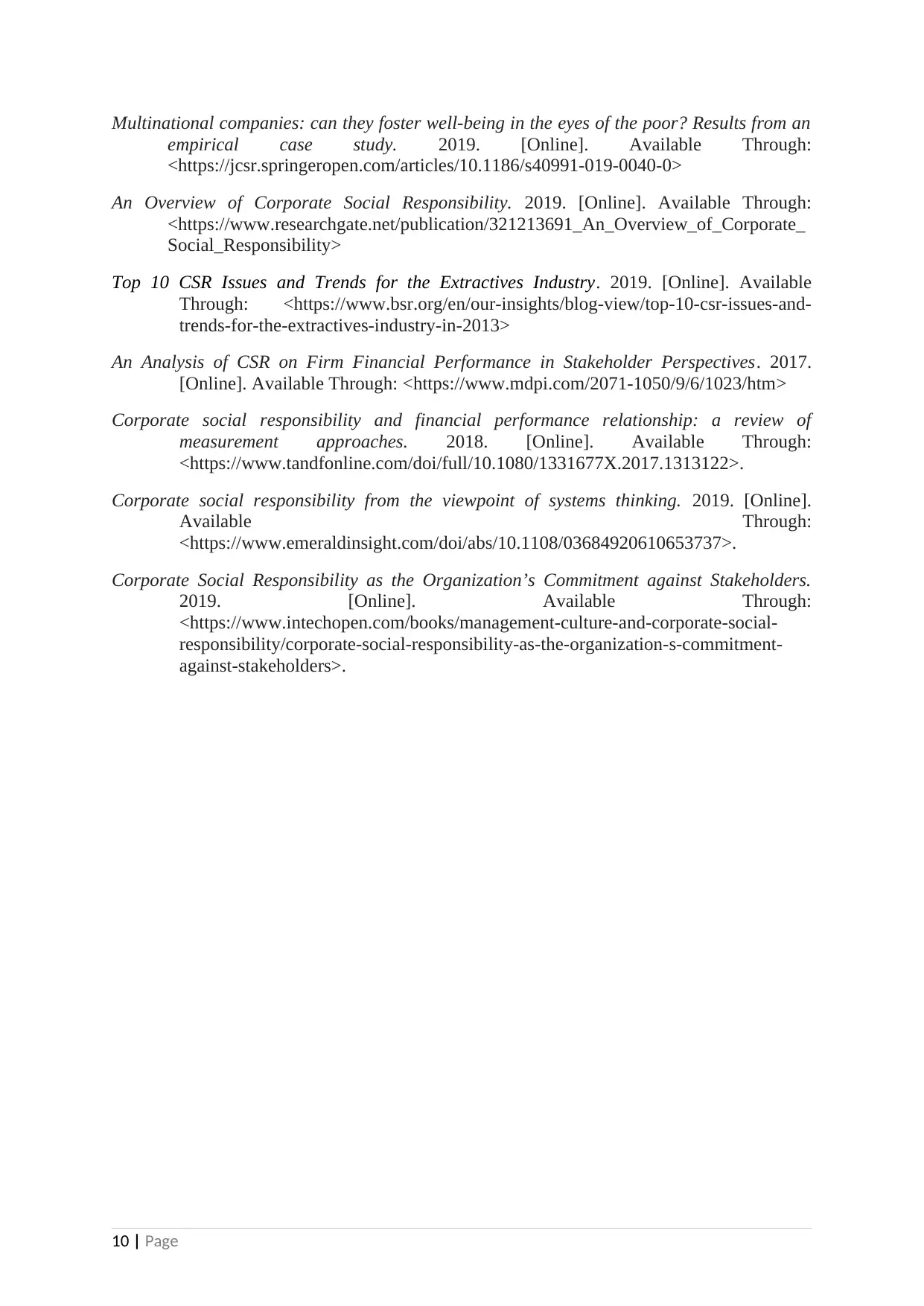
Multinational companies: can they foster well-being in the eyes of the poor? Results from an
empirical case study. 2019. [Online]. Available Through:
<https://jcsr.springeropen.com/articles/10.1186/s40991-019-0040-0>
An Overview of Corporate Social Responsibility. 2019. [Online]. Available Through:
<https://www.researchgate.net/publication/321213691_An_Overview_of_Corporate_
Social_Responsibility>
Top 10 CSR Issues and Trends for the Extractives Industry. 2019. [Online]. Available
Through: <https://www.bsr.org/en/our-insights/blog-view/top-10-csr-issues-and-
trends-for-the-extractives-industry-in-2013>
An Analysis of CSR on Firm Financial Performance in Stakeholder Perspectives. 2017.
[Online]. Available Through: <https://www.mdpi.com/2071-1050/9/6/1023/htm>
Corporate social responsibility and financial performance relationship: a review of
measurement approaches. 2018. [Online]. Available Through:
<https://www.tandfonline.com/doi/full/10.1080/1331677X.2017.1313122>.
Corporate social responsibility from the viewpoint of systems thinking. 2019. [Online].
Available Through:
<https://www.emeraldinsight.com/doi/abs/10.1108/03684920610653737>.
Corporate Social Responsibility as the Organization’s Commitment against Stakeholders.
2019. [Online]. Available Through:
<https://www.intechopen.com/books/management-culture-and-corporate-social-
responsibility/corporate-social-responsibility-as-the-organization-s-commitment-
against-stakeholders>.
10 | Page
empirical case study. 2019. [Online]. Available Through:
<https://jcsr.springeropen.com/articles/10.1186/s40991-019-0040-0>
An Overview of Corporate Social Responsibility. 2019. [Online]. Available Through:
<https://www.researchgate.net/publication/321213691_An_Overview_of_Corporate_
Social_Responsibility>
Top 10 CSR Issues and Trends for the Extractives Industry. 2019. [Online]. Available
Through: <https://www.bsr.org/en/our-insights/blog-view/top-10-csr-issues-and-
trends-for-the-extractives-industry-in-2013>
An Analysis of CSR on Firm Financial Performance in Stakeholder Perspectives. 2017.
[Online]. Available Through: <https://www.mdpi.com/2071-1050/9/6/1023/htm>
Corporate social responsibility and financial performance relationship: a review of
measurement approaches. 2018. [Online]. Available Through:
<https://www.tandfonline.com/doi/full/10.1080/1331677X.2017.1313122>.
Corporate social responsibility from the viewpoint of systems thinking. 2019. [Online].
Available Through:
<https://www.emeraldinsight.com/doi/abs/10.1108/03684920610653737>.
Corporate Social Responsibility as the Organization’s Commitment against Stakeholders.
2019. [Online]. Available Through:
<https://www.intechopen.com/books/management-culture-and-corporate-social-
responsibility/corporate-social-responsibility-as-the-organization-s-commitment-
against-stakeholders>.
10 | Page
Paraphrase This Document
Need a fresh take? Get an instant paraphrase of this document with our AI Paraphraser

11 | Page

12 | Page
⊘ This is a preview!⊘
Do you want full access?
Subscribe today to unlock all pages.

Trusted by 1+ million students worldwide
1 out of 12
Related Documents
Your All-in-One AI-Powered Toolkit for Academic Success.
+13062052269
info@desklib.com
Available 24*7 on WhatsApp / Email
![[object Object]](/_next/static/media/star-bottom.7253800d.svg)
Unlock your academic potential
Copyright © 2020–2025 A2Z Services. All Rights Reserved. Developed and managed by ZUCOL.





